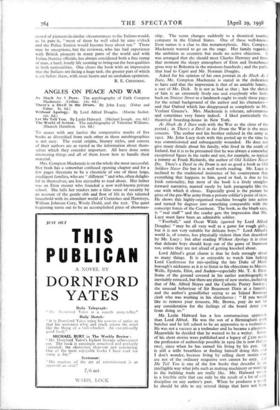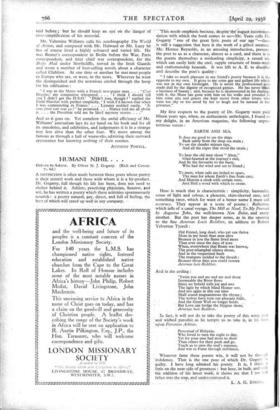ANGLES ON PEACE AND WAR
As Much As I Dare. The autobiography of Faith Compton Mackenzie. (Collins. 125. 6d.)
To assess with any justice the comparative merits of five books as diversified from each other as these autobiographies is not easy. The social origins, literary styles, and careers of their authors are as varied as the information about them- selves which they consider important. All have done some interesting things and all of them know how to handle their material.
Mrs. Compton Mackenzie is on the whole the most successful. Her book has a somewhat confused opening chapter and for a few pages threatens to be a chronicle of one of those large, intelligent families, who are" different "and who, often delight- ful in themselves, are less enjoyable to read about. Her father was an Eton master who founded a now well-known private school. She lulls her readers into a false sense of security by an account of the gentle ebb and flow of life in this talented household with its attendant world of Cornishes and Hawtreys, William Johnson Cory, Wooly Dodd, and the rest. The quiet beginning turns out to be an accomplished piece of showman- ship. The scene changes suddenly to a theatrical touring company in the United States. One of these well-known Eton names is a clue to this metamorphosis. Mrs. Compton Mackenzie wanted to go on the stage. Her family regarded the ambition as eccentric but made no active objection. It was arranged that she should meet Charles Hawtrey and from that moment the sleepy atmosphere of Eton and Stonehouse gives way to Bohemia in the nineteen-hundreds ; and the paths that lead to Capri and Mr. Norman Douglas.
Asked for his opinion of his own portrait in As Much As I Dare, Mr. Compton Mackenzie is stated in the dedication
to have said that the impression is that of an amiable lunatic, a sort of Mr. Dick. It is not as bad as that ; but the sketch of him is an extremely lively one and everybody who looks
back on Sinister Street as a landmark ought to study these pages for the actual background of the author and his characters—
and that Oxford which has disappeared as completely as Mr. Verdant Greene's. Mrs. Mackenzie is tolerant, adventurous and sometimes very funny indeed. I liked particularly the theatrical boarding-house in New York.
As Much As I Dare ends with the War as the close of the period ; in There's a Devil in the Drum the War is the main concern. The author and his brother enlisted in the army in 1912. Mr. John Lucy deals with this period up to the time he was commissioned and subsequently wounded. He does not give many details about his family, who lived in the south of
Ireland, but it is to be presumed that he was always a somewhat exceptional figure in the ranks and not, for example, so typical
a tommy as Frank Richards, the author of Old Soldiers Never Die. There's a Devil in the Drum is not so good a book as Old Soldiers Never Die but it is well worth reading. Mr. Lucy is
inclined to the traditional insistence of his countrymen that everything that happens to him, good or bad, is due to his Irish nationality, but most of the book is a lively straight- forward narrative, marred rarely by lush paragraphs like the
one with which it closes. Especially good is the picture he gives of the pre-War army from a private soldier's-point of view.
He shows this highly-organised machine brought into action and turned by degrees into something comparable with the conscript forces of the Continent. The book, as the blurb says, is "real stuff" and the reader gets the impression that Mr. Lucy must have been an admirable soldier.
"Football," said Oscar Wilde (quoted by Lord Alfred Douglas) "may be all very well as a game for rough girls ;
but it is not very suitable for delicate boys." Lord Alfred's world is, of course, less physically violent than that described by Mr. Lucy ; but after reading Without Apology it is clear that delicate boys should keep out of the game of literature too, unless they are not afraid of getting knocked about.
Lord Alfred's great charm is that he feels strongly about so many things. It is as enjoyable to watch him lashing
Lord Castlerosse for mis-spelling the late Duke of Marl-
borough's nickname as it is to listen to his objections to Messrs. Wells, Epstein, Eliot, and Auden—especially Mr. T. S. Eliot.
Some of the ground covered in his earlier autobiography is inevitably retraced, but there are plenty of new stories, including that of Mr. Alfred Noyes and the Catholic Poetry Society ; the unusual behaviour of Sir Beaumont Dixie at a funeral; and the author's grandfather saying to an Inland Revenue clerk who was working in his shirtsleeves : "If you would like to remove your trousers, Mr. Brown, pray do not let any consideration for the feelings of the board deter you from doing so."
Mr. Leslie Halward has a less contumacious approach than Lord Alfred. He was the son of a Birmingham pork
butcher and he left school to be an apprentice to a toolmaker. He was not a success as a toolmaker and he became a plasterer. Meanwhile he decided that he wanted to be a writer. Some of his short stories were published and a legacy of Lroo made the profession of authorship possible in 1929 (he is now thirty- two), since when he has earned his living by his pen. He is still a trifle breathless at finding himself doing this, and I don't wonder, because living by selling short stories that are not of the ordinary magazine sort cannot be easy. Let Me Tell You is one of the few books that describe in an intelligible way what jobs such as making machinery or working in the building trade are really like. Mr. Halward writes in a forcible style that can only be the result of a lot of scif- discipline on any author's part. When he produces a novel he should be able to say several things that have not been • said -before.; - -but- he should keep im eye Ma the 'dangei-of • over-simplification of his material.
Mr. Valentine Williams -calls his autobiography The World of Action, and compared with Mr. Halward , or Mr. Lucy hd 'has of course lived a highly coloured and varied life. He • , was Reuter's correspondent in Berlin before the War, Paris • correspondent, and later chief war correspondent, for the Daily Mail tinder Northcliffe, ietved in the Irish Guards and wrote a number of best-selling novels about a character called Clubfoot. At one time or another he met most people - in Europe who are, or were, in the news. Wherever he went the distinguished and the notorious circled through the hoop for his edification : "I was in the Metro with a French newspaper man. . . . C'est Dreyfus,' my companion whispered. . . . I think I should tell 70u I didn't get the D.S.0." Didn't you, though ? ' replied the Field-Marshal with perfect simplicity, I wish I'd known that when I was commanding in France.' . . . Lyautey nodded curtly. vous feral voir tout cal' he promised.. . . Ibanez told me all about it. . . . the President told me he liked mystery stories. . . ."
And so it goes on. Yet somehow the awful efficiency of Mr.
Williams' journalism lays its icy hand on his book and for all its anecdotes, and celebrities, and judgements it is in a strange way less alive than the other four. We move among the famous as through a hall of waxworks, admiring their outward appearance but knowing nothing of their essence.
ANTHONY POWELL.



























































 Previous page
Previous page